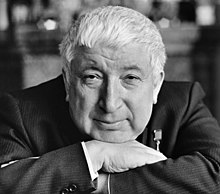You can help expand this article with text translated from the corresponding article in Russian. (July 2017) Click [show] for important translation instructions.
Content in this edit is translated from the existing Russian Wikipedia article at [[:ru:Гамзатов, Расул Гамзатович]]; see its history for attribution.{{Translated|ru|Гамзатов, Расул Гамзатович}} to the talk page. |
Rasul Gamzatovich Gamzatov (Avar: ХӀамзатазул Расул ХӀамзатил вас, romanized: Ħamzatazul Rasul Ħamzatil vas, IPA: [ħamzatil rasul]; Russian: Расу́л Гамза́тович Гамза́тов; 8 September 1923 – 3 November 2003) was a popular Russian poet who wrote in Avar. Among his poems was Zhuravli, which became a well-known Soviet song.[1]
Rasul Gamzatov
| |
|---|---|
Расул Гамзатов
ХӀамзатазул Расул | |
 | |
| Born | (1923-09-08)8 September 1923 |
| Died | 3 November 2003(2003-11-03) (aged 80) |
| Occupation | Poet |
| Title | Hero of Socialist Labour (1974) |
| Awards |
|
Gamzatov was born on 8 September 1923 in the Avar village of Tsada in the north-east Caucasus. His father, Gamzat Tsadasa, was a well-known bard, heir to the ancient tradition of minstrelsy still thriving in the mountains.[2] He was eleven when he wrote his first verse about a group of local boys who ran down to the clearing where an airplane had landed for the first time. A number of different poems by him also became songs, such as Gone Sunny Days.
In 1939 he graduated from Pedagogical College. He had various jobs serving as a school teacher, an assistant director in the theater, a journalist in newspapers and a radio host. From 1945 to 1950 he studied at the Maxim Gorky Literature Institute.
Gamzatov was awarded the State Stalin Prize in 1952, The Lenin Prize in 1963, and Laureate Of The International Botev Prize in 1981.
Gamzatov died on 3 November 2003 at the age of 80 in the Moscow Central Clinical Hospital. He was buried in the old Muslim cemetery in Tarki, next to the grave of his wife.
A monument to Gamzatov was unveiled on 5 July 2013 on Yauzsky Boulevard in central Moscow.[3]